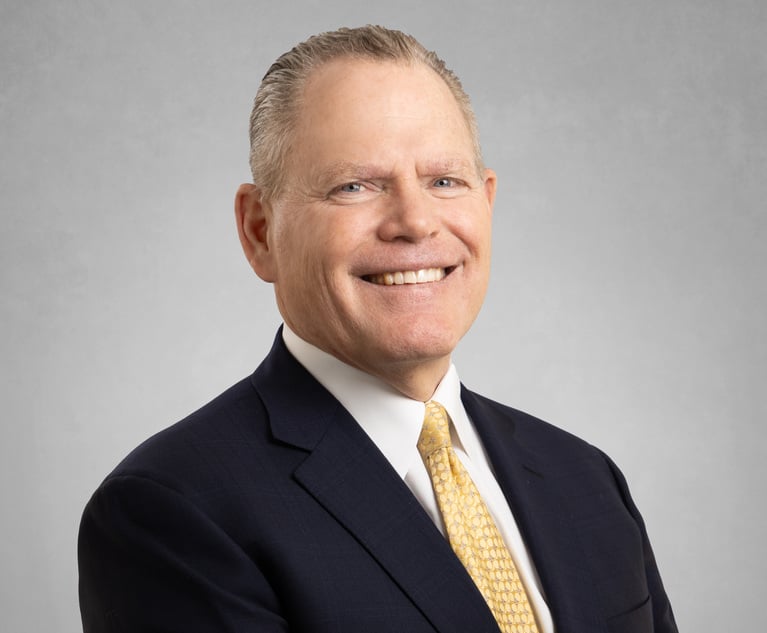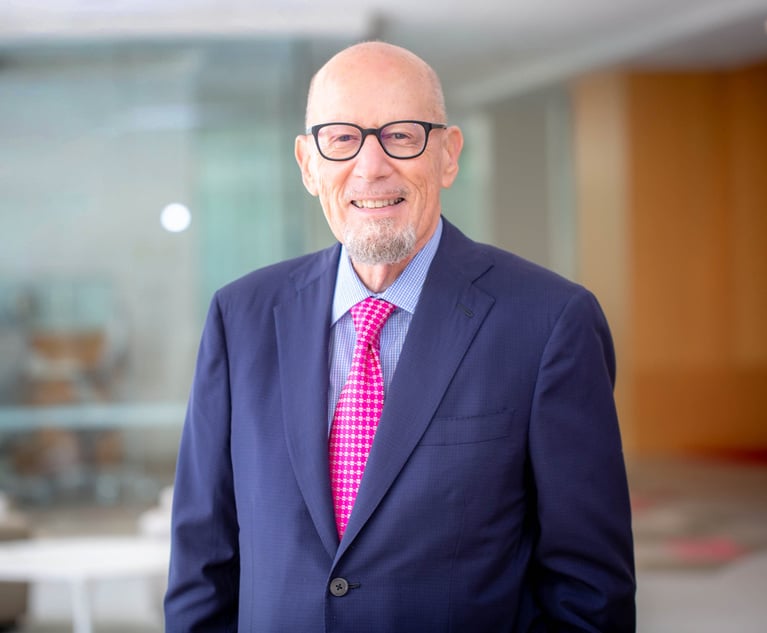How I Made Partner: Desmarais' Laurie Stempler
"If you do not genuinely care about people or you do not think about how you can help others, you cannot leverage your network to develop business."
September 05, 2019 at 12:16 PM
7 minute read
Laurie Stempler, 37, Desmarais
Office: New York.
Practice area: Patent litigation.
Law school and year of graduation: Brooklyn Law School, 2009.
How long have you been at the firm? Seven years.
How long were you an associate at the firm? Five and a half years.
Were you an associate at another firm before joining your present firm? I started my career in the intellectual property group at Willkie Farr & Gallagher. I left toward the end of my third year.
What year did you make partner at your current firm? 2018.
 Laurie Stempler
Laurie StemplerWhat's the biggest surprise you experienced in becoming partner? Even though my title changed overnight, I have been surprised by how gradual the actual transition has been. My focus expanded from developing and sharpening my legal skills to taking on several new leadership responsibilities. For example, I am much more involved with firm management—not just client matters, but executive matters that help our firm run smoothly, such as streamlining associate case assignment, expanding our recruiting efforts, negotiating with external vendors, launching our women's initiatives, and seeking new ways to market our firm's expertise.
I have also shifted from thinking about law as a service industry to understanding it more fully as a business. That meant embarking on a journey to learn how to develop clients, how to better cultivate client relationships and networks that can transition into new business, and how to best understand existing clients' industries. I also closely track the professional development of the associates working on my teams. I am very mindful of their skill development. I continually work to identify areas for them to grow and ways they can better serve our clients while advancing in their own careers. Transitioning to managing people and stepping up as a leader at the firm takes time. It is a learning process and has pushed me to grow beyond being an astute lawyer. Before, I did not realize just how crucial it is for law firm partners to develop excellent management and business skills. I have therefore devoted significant time to bolstering my leadership skills and also reserved time to focus on business development.
What do you think was the deciding point for the firm in making you partner? I think it was a combination of consistently delivering high-quality work and quickly adapting to different teams and technologies. Although I focused on pharmaceutical patent litigation at the beginning of my career, when I moved to Desmarais, I expanded my practice to include other technologies, like smartphone features, web functionality and computer architecture. I also demonstrated that I could quickly get up to speed on a case and support the team where needed, including in a leadership capacity. For example, in one matter I was brought on to interview and identify testifying experts, but I ended up expanding my role to take the lead on the damages issues in the case, which I eventually presented at trial. My work on damages helped our client, IBM, win an $82.5 million jury award. In addition, I sought opportunities to work with as many people as possible, even if it was for a brief matter, such as one of the matters we have handled for the Veterans Consortium Pro Bono Program. By the time I was up for consideration, every partner had firsthand experience in seeing how I could deliver for the firm and its clients, including new partners with whom I'd worked when they were associates. I think earning their trust was critical to my advancement.
Describe how you feel now about your career now that you've made partner. I remember attending team meetings as a first-year associate, observing the senior associates and partners around me as they debated complicated legal questions, and thinking, "I cannot imagine how I will ever have this kind of command of patent law." Sensing that I was overwhelmed, my boss at the time told me, "Right now, a great way for you to contribute is to talk about the facts, which you know better than any of us." It was a larger message that continues to apply today: Be confident in what you know and grow your knowledge base and skill set from there. I have gained the skills to engage in sophisticated discussions about patent law and strategy, so now I am focused on learning law as a business. I also monitor industry shifts to maintain both high-level and in-depth understandings of emerging technologies. I am very proud of my growth as an attorney, and making partner was a great milestone, but I'm just getting started.
What's the key to successful business development in your opinion? It is so important to stay in touch with people. You truly never know where your next potential matter will originate, so maintain relationships with former classmates and colleagues. I never looked around my law school class and thought about where everyone would be in 10 years, but I wish I had! Stay open minded about who can connect you to a potential new client. As an example, I recently landed a meeting with a major tech company through a former summer associate who worked at our firm several years ago. We have always kept in touch and caught up at various industry events, so I felt very comfortable asking for the introduction. All of that said, you have to view your network as more than just a source of business. If you do not genuinely care about people or you do not think about how you can help others, you cannot leverage your network to develop business. People like working with those they respect and who have respected them.
What's been the biggest change, day to day, in your routine since becoming partner?Because I have more one-on-one client contact as a partner and am responsible for maintaining successful relationships, I started devoting much more time to learning about the history and current landscape of my clients' businesses and industries. In addition to learning about how a company started, how it developed its product pipeline, and what its core values are, I keep apprised of the competition, the latest challenges the industry is facing, and the impact of public policy changes. I rely on a variety of resources—such as daily newspapers, magazine subscriptions, business podcasts and biographies—to educate myself. Understanding the latest events that are affecting an industry gives me insight into clients' concerns, which helps me and my team provide a better service.
Why did you decide to practice at a boutique firm? In my experience, the key to job satisfaction is liking your co-workers. The attorneys and staff at Desmarais make it a special place to work. Every day I run into people who put a smile on my face, and I am delighted that the friendly, down-to-earth attorneys who interviewed me seven years ago are now my partners. That environment can be tough to foster in larger general practice firms.
Got a suggestion for a new partner to profile here? Contact [email protected].
This content has been archived. It is available through our partners, LexisNexis® and Bloomberg Law.
To view this content, please continue to their sites.
Not a Lexis Subscriber?
Subscribe Now
Not a Bloomberg Law Subscriber?
Subscribe Now
NOT FOR REPRINT
© 2025 ALM Global, LLC, All Rights Reserved. Request academic re-use from www.copyright.com. All other uses, submit a request to [email protected]. For more information visit Asset & Logo Licensing.
You Might Like
View All
How I Made Managing Partner: 'Be the Uniting Voice of the Firm,' Says George Ogilvie of McDonald Carano

How I Made Managing Partner: 'Educate Yourself About Law Firm Economics,' Says Gregory Hessinger of Mitchell Silberberg

Cozen O'Connor's Bernard Nash Pioneered the Modern State AGs Practice. Now He's Hanging Up His Boots
6 minute readTrending Stories
- 1Uber Files RICO Suit Against Plaintiff-Side Firms Alleging Fraudulent Injury Claims
- 2The Law Firm Disrupted: Scrutinizing the Elephant More Than the Mouse
- 3Inherent Diminished Value Damages Unavailable to 3rd-Party Claimants, Court Says
- 4Pa. Defense Firm Sued by Client Over Ex-Eagles Player's $43.5M Med Mal Win
- 5Losses Mount at Morris Manning, but Departing Ex-Chair Stays Bullish About His Old Firm's Future
Who Got The Work
J. Brugh Lower of Gibbons has entered an appearance for industrial equipment supplier Devco Corporation in a pending trademark infringement lawsuit. The suit, accusing the defendant of selling knock-off Graco products, was filed Dec. 18 in New Jersey District Court by Rivkin Radler on behalf of Graco Inc. and Graco Minnesota. The case, assigned to U.S. District Judge Zahid N. Quraishi, is 3:24-cv-11294, Graco Inc. et al v. Devco Corporation.
Who Got The Work
Rebecca Maller-Stein and Kent A. Yalowitz of Arnold & Porter Kaye Scholer have entered their appearances for Hanaco Venture Capital and its executives, Lior Prosor and David Frankel, in a pending securities lawsuit. The action, filed on Dec. 24 in New York Southern District Court by Zell, Aron & Co. on behalf of Goldeneye Advisors, accuses the defendants of negligently and fraudulently managing the plaintiff's $1 million investment. The case, assigned to U.S. District Judge Vernon S. Broderick, is 1:24-cv-09918, Goldeneye Advisors, LLC v. Hanaco Venture Capital, Ltd. et al.
Who Got The Work
Attorneys from A&O Shearman has stepped in as defense counsel for Toronto-Dominion Bank and other defendants in a pending securities class action. The suit, filed Dec. 11 in New York Southern District Court by Bleichmar Fonti & Auld, accuses the defendants of concealing the bank's 'pervasive' deficiencies in regards to its compliance with the Bank Secrecy Act and the quality of its anti-money laundering controls. The case, assigned to U.S. District Judge Arun Subramanian, is 1:24-cv-09445, Gonzalez v. The Toronto-Dominion Bank et al.
Who Got The Work
Crown Castle International, a Pennsylvania company providing shared communications infrastructure, has turned to Luke D. Wolf of Gordon Rees Scully Mansukhani to fend off a pending breach-of-contract lawsuit. The court action, filed Nov. 25 in Michigan Eastern District Court by Hooper Hathaway PC on behalf of The Town Residences LLC, accuses Crown Castle of failing to transfer approximately $30,000 in utility payments from T-Mobile in breach of a roof-top lease and assignment agreement. The case, assigned to U.S. District Judge Susan K. Declercq, is 2:24-cv-13131, The Town Residences LLC v. T-Mobile US, Inc. et al.
Who Got The Work
Wilfred P. Coronato and Daniel M. Schwartz of McCarter & English have stepped in as defense counsel to Electrolux Home Products Inc. in a pending product liability lawsuit. The court action, filed Nov. 26 in New York Eastern District Court by Poulos Lopiccolo PC and Nagel Rice LLP on behalf of David Stern, alleges that the defendant's refrigerators’ drawers and shelving repeatedly break and fall apart within months after purchase. The case, assigned to U.S. District Judge Joan M. Azrack, is 2:24-cv-08204, Stern v. Electrolux Home Products, Inc.
Featured Firms
Law Offices of Gary Martin Hays & Associates, P.C.
(470) 294-1674
Law Offices of Mark E. Salomone
(857) 444-6468
Smith & Hassler
(713) 739-1250










